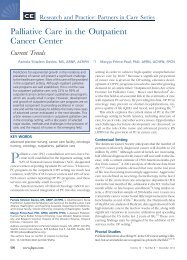social work practice and the law - Springer Publishing
social work practice and the law - Springer Publishing
social work practice and the law - Springer Publishing
You also want an ePaper? Increase the reach of your titles
YUMPU automatically turns print PDFs into web optimized ePapers that Google loves.
1. Identifying <strong>the</strong> Legal Needs <strong>and</strong> Realizing <strong>the</strong> Rights of Social Work Clients 15<br />
MEETING THE LEGAL NEEDS OF LOW-INCOME CLIENTS:<br />
WHAT SOLUTIONS ARE BEING PROPOSED AND HOW<br />
THE SOCIAL WORK PROFESSION CAN PARTICIPATE<br />
The reports that document <strong>the</strong> lack of access to justice experienced by lowincome<br />
individuals <strong>and</strong> <strong>the</strong> increasing numbers of “pro se” litigants advocate<br />
for increased funding <strong>and</strong> use of pro bono, or volunteer legal services as a<br />
direct method of decreasing <strong>the</strong> “justice gap.” As you learned in <strong>the</strong> section<br />
of this chapter that addressed <strong>the</strong> legal needs of low-income criminal defendants,<br />
one reason preventing <strong>the</strong> effective representation of a client is that<br />
<strong>the</strong>ir <strong>law</strong>yer often does not have access to professional expertise or support<br />
personnel. Social <strong>work</strong>ers can respond to this need by offering pro bono services<br />
to legal aid offices to assist in client defense, to do home visits <strong>and</strong> adoption<br />
studies, <strong>and</strong> can also offer <strong>the</strong>ir services to courts so that <strong>the</strong> <strong>social</strong> <strong>work</strong>er<br />
can be assigned to assist attorneys in <strong>the</strong>ir representation of clients. Social <strong>work</strong><br />
professors <strong>and</strong> experienced practitioners in areas such as clinical <strong>social</strong> <strong>work</strong>,<br />
<strong>social</strong> welfare policy, <strong>and</strong> <strong>social</strong> <strong>work</strong> <strong>practice</strong> can volunteer to testify as an<br />
expert witness in a range of cases such as identifying best <strong>practice</strong> <strong>and</strong><br />
proper procedure in child welfare cases or summarizing <strong>the</strong> research base<br />
about a particular topic such as <strong>the</strong> impact of exposure to community violence<br />
<strong>and</strong> risk of juvenile delinquency.<br />
Ano<strong>the</strong>r way <strong>the</strong> profession can be involved is to not only produce<br />
research that documents <strong>the</strong> effects of <strong>the</strong> <strong>law</strong> <strong>and</strong> legal policy on <strong>practice</strong><br />
but to underst<strong>and</strong> <strong>the</strong> role that <strong>social</strong> <strong>work</strong>ers can play in <strong>the</strong> various legal<br />
systems as a knowledge broker (Madden & Wayne, 2005). In this role <strong>social</strong><br />
<strong>work</strong>ers are aware of <strong>the</strong> power <strong>the</strong>y have to introduce <strong>social</strong> science <strong>and</strong><br />
empirical research into <strong>the</strong> decision-making processes across all systems of<br />
<strong>law</strong>. Social <strong>work</strong>ers can bring <strong>social</strong> science research to <strong>the</strong> attention of<br />
<strong>law</strong>yers <strong>and</strong> judges <strong>and</strong> introduce evidence-based <strong>practice</strong> as a frame<strong>work</strong><br />
to be used for <strong>the</strong> development of legal policies, programs, <strong>and</strong> decisions.<br />
Pragmatically, given <strong>the</strong> current economic situation, <strong>the</strong> reports also<br />
suggest that <strong>the</strong> greatest impact can be made through collaborative advocacy<br />
projects with <strong>social</strong> service organizations (Legal Services Corporation, 2009;<br />
Legal Services NY, 2009). Across <strong>the</strong> country <strong>the</strong>re are two types of collaborative<br />
initiatives that are of interest to <strong>social</strong> <strong>work</strong>ers. The first intervention<br />
involves providing legal training <strong>and</strong> support to non<strong>law</strong>yer professionals<br />
such as <strong>social</strong> <strong>work</strong>ers, teachers, clergy, <strong>and</strong> medical personnel. This “indirect”<br />
service can greatly exp<strong>and</strong> <strong>the</strong> number of clients who receive legal information,<br />
materials, referrals, <strong>and</strong> who can be assisted in identifying a<br />
problem as a legal issue. Social <strong>work</strong>ers <strong>work</strong>ing in community-based agencies<br />
can proactively reach out to legal service providers to arrange training for<br />
<strong>the</strong>mselves <strong>and</strong> <strong>the</strong>ir clients as well as net<strong>work</strong> with self-help community<br />
organizations.<br />
The second kind of collaborative intervention involves legal service providers<br />
teaming up with o<strong>the</strong>r agencies <strong>and</strong> professions to think more broadly<br />
about exp<strong>and</strong>ing <strong>the</strong> number, <strong>and</strong> kinds of solutions to <strong>the</strong> multiple <strong>and</strong><br />
complex problems faced by low-income individuals <strong>and</strong> families. The goal<br />
of collaboration is to provide a “holistic solution” by offering clients a mix of
















